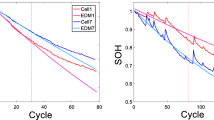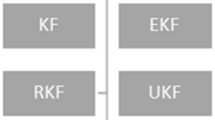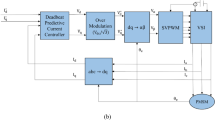Abstract
Aimed at improving SOC estimation accuracy, speed and robust of battery on electric vehicle, SOC estimation method based on adaptive particle filter is proposed. 1-order RC and lag model, 2-order RC and lag model, 3-order RC and lag model are built. Particle Swarm algorithm is used to search optimal parameters. Considering calculation and model accuracy, 1-order lag model is chosen. Traditional particle filter principle is analyzed. State estimation is a substitute to observation equation, and observation estimation is gotten. Observation noise variance is adjusted adaptively through observation error. Verification by simulation, convergence speed and robust of adaptive particle filter are superior to traditional algorithm when SOC original error is large. Besides, SOC estimation accuracy and stability is superior to traditional algorithm obviously.







Similar content being viewed by others
REFERENCES
Pattipati, B., Pattipati, K., Christopherson, J.P., et al., Automotive battery management systems, 2008 IEEE AUTOTESTCON, 2008.
Snihir, I., Rey, W., Verbitskiy, E., et al., Battery open-circuit voltage estimation by a method of statistical analysis, J. Power Sources, 2006, vol. 159, no. 2, pp. 1484–1487.
Zhang, J., DUFK-based power battery internal resistance and SOC estimation, Telecom Power Technol., 2017, vol. 34, no. 1, pp. 104–106.
Liu, Z., Li, Z., Zhang, J., et al., Accurate and efficient estimation of lithium-ion battery state of charge with alternate adaptive extended Kalman filter and ampere-hour counting methods, Energies, 2019, vol. 12, no. 4, p. 757.
Lin, H.T., Liang, T.J., and Chen, S.M., Estimation of battery state of health using probabilistic neural network, IEEE Trans. Ind. Inf., 2012, vol. 9, no. 2, pp. 679–685.
Zhang, L., Li, K., Du, D., et al., A sparse least squares support vector machine used for SOC estimation of Li-ion Batteries, IFAC-PapersOnLine, 2019, vol. 52, no. 11, pp. 256–261.
Vasebi, A., Partovibakhsh, M., and Bathaee, S.M.T., A novel combined battery model for state-of-charge estimation in lead-acid batteries based on extended Kalman filter for hybrid electric vehicle applications, J. Power Sources, 2007, vol. 174, no. 1, pp. 30–40.
Shao, S., Bi, J., Yang, F., et al., On-line estimation of state-of-charge of Li-ion batteries in electric vehicle using the resampling particle filter, Transp. Res. Part D: Transp. Environ., 2014, vol. 32, pp. 207–217.
Li, T., Sun, S., and Sattar, T., Adapting sample size in particle filters through KLD-resampling, Electron. Lett., 2013, vol. 49, no. 12, pp. 740–742.
Zuo, J., Jia, Y., Zhang, Y., and Lian, W., Adaptive iterated particle filter, Electron. Lett., 2013, vol. 49, no. 12, pp. 742–744.
Straka, O. and Simandl, M., Particle filter with adaptive sample size, Kybernetika, 2011, vol. 47, no. 3, pp. 385–400.
Plett, G.L., Extended Kalman filtering for battery management systems of LiPB-based HEV battery packs: Part 3. State and parameter estimation, J. Power Sources, 2004, vol. 134, no. 2, pp. 277–292.
Ramadan, H.S., Bendary, A.F., and Nagy, S., Particle swarm optimization algorithm for capacitor allocation problem in distribution systems with wind turbine generators, Int. J. Electr. Power Energy Syst., 2017, vol. 84, pp. 143–152.
Jwo, D.J., Chung, F.C., and Yu, K.L., GPS/INS integration accuracy enhancement using the interacting multiple model nonlinear filters, J. Appl. Res. Technol., 2013, vol. 11, no. 4, pp. 496–509.
Hu, Z., Liu, X., and Hu, Y., Particle filter based on the lifting scheme of observations, IET Radar Sonar Navig., 2014, vol. 9, no. 1, pp. 48–54.
Funding
This study is sponsored by Hubei Provincial Natural Science Foundation of China (2018CFC863, 2019CFC837); China Postdoctoral Science Foundation (2019M661913, 2018M642181); National Science Foundation of China (61906076) should be modified to National Science Foundation of China (52002215, 61906076); Natural Science Foundation of Jiangsu Province (BK20190853); JITRI Suzhou Automotive Research Institute Project (CEC20190404); the Research Project of Hubei Provincial Department of Education (Q20182905); the Scientific Research Project of Huanggang Normal University.
Author information
Authors and Affiliations
Contributions
Jiabao Tao, Chuan Sun wrote the first draft of the manuscript. All authors edited the manuscript and approved the final version. All authors made substantial contributions to conception and design, analysis, and interpretation of data, and critical review of the manuscript. Jiabao Tao secured funding, interpretation of the results, and wrote the manuscript. Chuan Sun carried out the design of the study, performed the statistical analyses, and the revision of the manuscript. Dunyao Zhu performed statistical analyses of mediation, and helped rewrite the manuscript substantially during the revision process. Yuli Ma helped get the funding for the study, advised on SOC estimation methods, and was involved in drafting the manuscript. Haibo Li, Yicheng Li and Tingxuan Xu helped with literature review and revising the manuscript. Duanfeng Chu have been involved in revising the manuscript critically for important intellectual content.
Corresponding author
Ethics declarations
COMPLIANCE WITH ETHICAL STANDARDS
This article does not contain any studies involving human or animals participants performed by any of the authors.
CONFLICT OF INTEREST
The authors declare that they have no conflicts of interest.
About this article
Cite this article
Jiabao Tao, Zhu, D., Sun, C. et al. A Novel Method of SOC Estimation for Electric Vehicle Based on Adaptive Particle Filter. Aut. Control Comp. Sci. 54, 412–422 (2020). https://doi.org/10.3103/S0146411620050089
Received:
Revised:
Accepted:
Published:
Issue Date:
DOI: https://doi.org/10.3103/S0146411620050089




